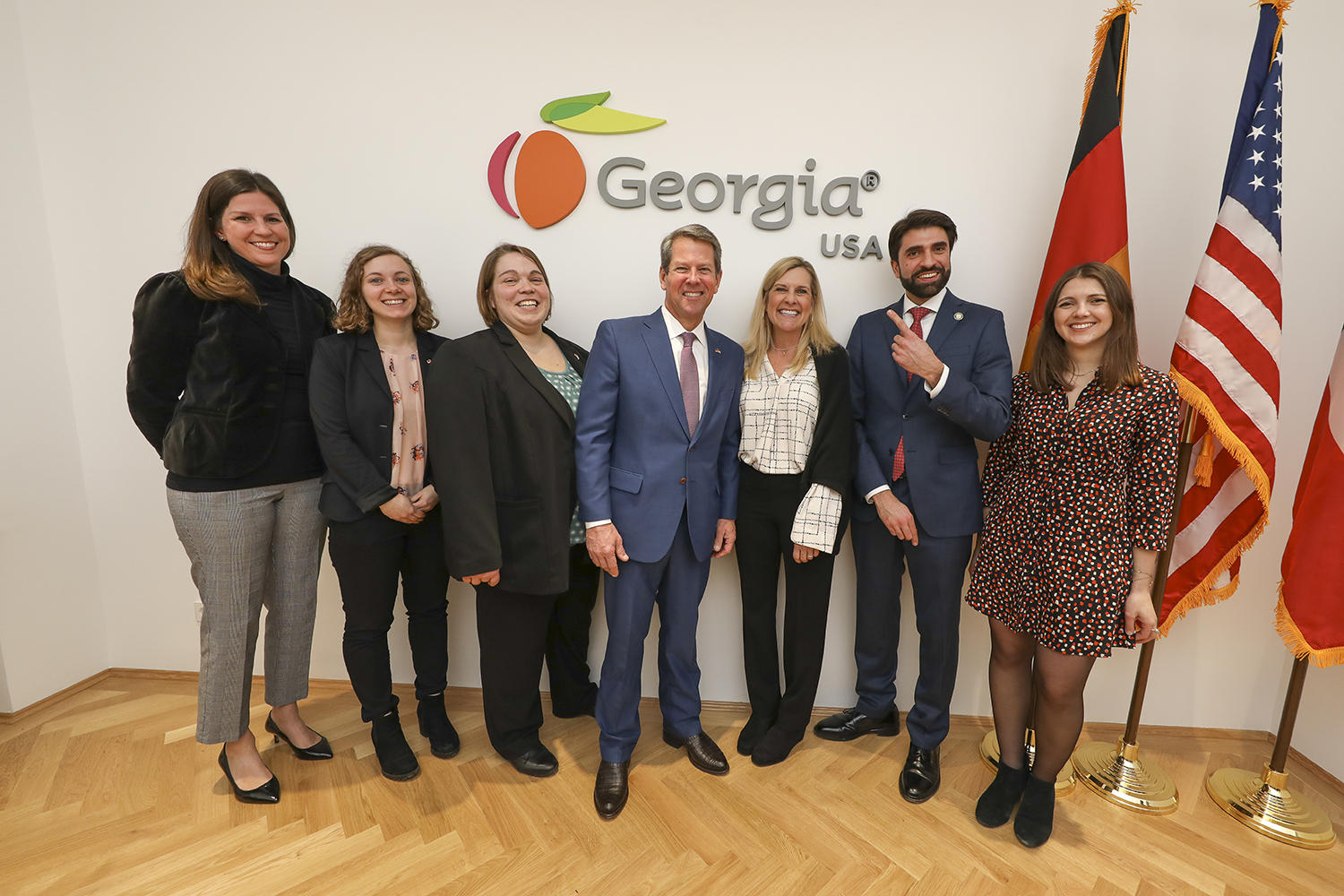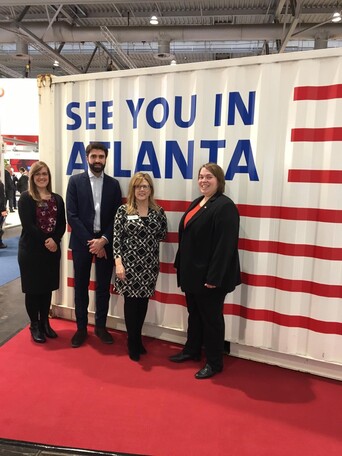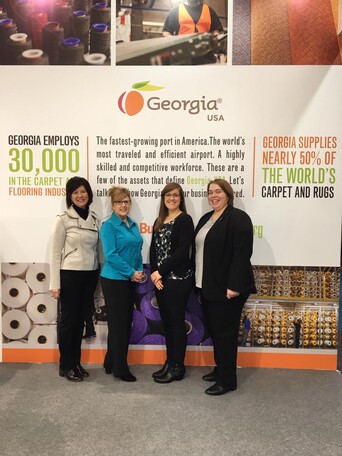International Representative Spotlight: Germany

International Representative Spotlight: Germany

Interviewee Names and Titles:
Sergio Domingues, Managing Director
Ulrike Schauerte, Trade Representative
Georgia established representation in Europe in 1973. Originally located in Brussels, the office moved to Munich in the early 2000s. This office focuses on Germany and Italy for trade and continental Europe for foreign direct investment (FDI).
Where is the office based: We are based in Munich, Germany.
Who are the team members: We have 5 full-time staff members covering both international trade and FDI.

How did you enter the world of exporting/trade and how long have you been working in this field?
Ulrike: I was a part of the first generation in Germany to study entirely in English and get a bachelor’s in Business Administration, back in 1999. Part of the program required an internship abroad, which I ended up doing at the German American Chamber of Commerce in Atlanta. I went back to Atlanta for a traineeship after I got my degree and while I was there, found out Georgia had representation in Munich. That’s how I ended up working with the state. I started as an office manager, helped with marketing, then became the business director for Italy, because that’s where I grew up. Four years ago, I transitioned to my current position as Trade Representative.
Sergio: I joined GDEcD in March of 2018. Previously, I worked at the U.S. Chamber of Commerce in Washington for a few years, right around the time the CAFTA-DR was being implemented and the pending trade agreements with Korea, Columbia, and Panama were in the pipeline. From my end, it was really just monitoring and supporting the efforts of U.S. industry to encourage the passage of those trade agreements. In addition, I also had the opportunity to witness how Germany and Bavaria approached economic development during my time at Germany Trade & Invest and the Bavarian Ministry of Economy.
What typical services do you provide for Georgia exporters interested in your market?
U: It’s mostly helping companies understand how to enter the German market by conducting initial market research, identifying and contacting potential business partners, or helping them prepare for a trade show by setting up meetings or answering questions they may have. Generally speaking, I am here to help Georgia companies with whatever they may need to conduct business in the countries we represent – market research reports and business partner identifications are the main services, but I have also assisted with other smaller requests, like short translations, or helping Georgia exporters connect with European companies when they aren’t being responsive.
S: We’re not just the eyes and ears for GDEcD, we’re the eyes and ears for Georgia companies. We’re at their disposal to understand this vast market that’s almost as big as the U.S. It has a unique set of regulations, which some companies would say is highly regulated. One thing we did recently was bring together a panel of experts to discuss the newly introduced regulations on medical devices (EU-MDR). We’re putting this information out there, should they want to enter the EU market and have their products comply with local regulations. We are a resource to Georgia businesses and we want to ensure that they have the benefit of information to allow them to make the best possible decision to either sell, grow, or enter the market.

What do you consider the biggest challenge(s) to exporters interested in your market? What about the greatest opportunity?
U: One of the biggest challenges is that Europe is such a diverse market. This can be an opportunity as well. What might work in Italy might not work in Germany and vice versa. Many distributors have a tight network throughout Europe, so if you do have the right distributor with the right network, you’re most likely to succeed in more than one country. Depending on the industry, another big challenge can be the bidding process, because European laws are strict about what needs to be done and how it needs to be done. Oftentimes, the bid has to be submitted in the language of the country that is asking for the bids. We’ve also heard from a lot of companies that Covid-19 has made logistics tougher, with container shipments being delayed by weeks, not just days. Hopefully, that will get better with time.
Are there any trends, be it in policy, culture, or consumption habits that exporters should be aware of when considering the market?
S: You must consider differences in business culture. Different styles, different demeanors, different expectations apply to different markets. A great resource for companies to explore are GDEcD’s market export guides* and required reading for any Georgia company considering growing sales in the European market!
U: It is becoming a little less formal when it comes to interactions with Italian companies, such as using the informal ‘you’ in Italian on their websites. However, in face-to-face meetings, you don’t ever use the informal ‘you’ unless you have known the person for a long time and you have established a relationship. In virtual meetings, it’s considered impolite to not have your camera turned on when you first meet a company, otherwise the company might think you’re trying to hide something.
The EU, national, and regional levels have very strict laws about food and GMO. Companies need to be aware of all of these rules before trying to enter the market. We’ve also seen an increase of people buying what we call “bio” or organic products. A lot of people have tried to go vegetarian or part-time vegetarian. The market challenge for Georgia exporters is the increased interest in buying local food.
*To receive a copy of these guides please contact Knali Price ([email protected]).
What advice do you have for companies looking to start exporting to your market?
U: Have patience and understand that it takes time to form relationships. Just because we find companies interested in your product doesn’t mean you will be selling them next week.
S: Have a conversation with us and let us help you build a road map before you set out on this endeavor. When it comes to patience, we understand that it’s very layered and strictly regulated, but when you manage to make a deal, the sweetness of the deal is that it is long-lasting. If you forge a good relationship with the company, the company will take that relationship seriously, and ensure that it continues over time to bring sustained growth and sales.
Companies should also be aware that there are ocean freight carriers with weekly or monthly services that connect from Savannah to European ports. The Port of Savannah is one of the crown jewels of our value proposition. It’s the greatest tool Georgia companies have to ship their products anywhere in the world. They shouldn’t feel hindered by the fact that they can’t move their goods. If you look at the connections at the airport, both freight and passenger, and the Port of Savannah, Georgia not only serves as a critical gateway to the U.S. market, but to global markets and Georgia’s international representatives are on the ground to help on the other end.

Tell us about a memorable time when you were able to help a Georgia company avoid or overcome a major pitfall in your market? What was the situation and what do you want other companies to learn from this?
U: It wasn’t so much a pitfall, but there was a Georgia company working on a project with a German company at a port in northern Germany, and they had some questions about labor laws and contacted their local chamber in Georgia. As German labor laws are very different from US labor laws, the Chamber referred them to me. I was able to put them in contact with a local German chamber, and it just so happened that one of their fields of expertise was local labor laws. It took a matter of six hours to help them. It’s just an example to show that Georgia companies who run into issues here can contact us at any time. We might not always have the answer, but we can often put them in contact with the right people who will have the answer.
What made the most impression on you when you visited Georgia?
U: I really like how approachable people are. I might not like the summers there because of the humidity and the heat and I am more of a winter person, but when I visit Georgia it always feels like I’m coming home.
S: For me, it’s the hundreds of European companies that have established themselves, grown in the state, become contributing members of their communities and that now form part of the fabric of the state.
What do you enjoy most about representing Georgia in Europe?
S: The fact that the hard work of this office and of our colleagues in Atlanta and around the world will continue to improve the livelihoods of hard-working Georgians and position the state for greater things. The state’s record-setting performance on trade and investment is exciting, and it is truly gratifying to see how companies and their respective communities will continue to flourish with the countless successes across the state.
What do you think would most surprise Georgians to learn of the European market?
U: How diverse it is. There is no such thing as the “European market.” It’s a lot of small national markets within the EU. As we’ve already said, what works in one country doesn’t necessarily work in another. There’s no blueprint for Europe, you must look at each country individually.
S: Germany hosts some of the largest trade shows in the world, such as ANUGA, MEDICA, or DOMOTEX and Georgia has a presence at all of them. German trade shows are significant gatherings for almost any industry you can think of.
A Georgia company can make a connection with European buyers, suppliers, distributors, or partners, and consider whether Germany has a show that addresses my needs. It’s not only about exhibiting, there’s seminars, keynotes, and panels. Georgia participants can come away with knowledge to help them be successful internationally. You get to network and meet people from all over the world.
Are you a Georgia business looking for help growing your international sales? Find out how Georgia’s International Trade Team can help at www.Georgia.org/Trade.
